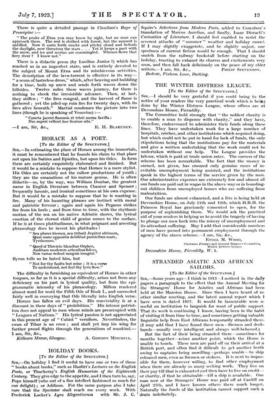HORACE AS A POET.
[To the Editor of the SPECTATOR.]
Sin,—In estimating the place of Horace among the immortals, it must be remembered that he founds his claim to that place not upon his Satires and Epistles, but upon his Odes. In form these arc certainly exquisitely elaborated and finished. But it would be a mistake to suppose that Horace is a mere stylist.
His Odes are certainly not the callow productions of youth ; they are the emanations of his mature genius. He is often didactic—so, by the way, was William Dunbar, the greatest name in English literature between Chaucer and Spenser; frequently laconic, and ironical sometimes at his own expense. But it would be a mistake to suppose that he is wanting in fire. Many of his haunting phrases are instinct with moral and patriotic fervour ; again and again his Pegasus strikes fire from his heels ; and from time to time, with the rhythmic motion of the sea on his native Adriatic shores, the lyrical emotion of the eternal child of genius comes to the surface.
If he is at times platitudinous, in what poignant and arresting phraseology does he invest his platitudes !
" Seu plures hiemes, seu tribuit Jupiter ultimam, Quae num oppositis debilitat pumieibus mare, Tyrrhenurn.'
" Quod si ThreIcio blandius Orpheo. Auditam moderere arboribus fideni, Non vanae redeat sanguis imagini."
Byron tells us he hated him, but "Not for thy faults but mine ; it is a curse To understand, not feel thy lyric flow."
The difficulty in furnishing an equivalent of Horace in other tongues, so far as it is a special difficulty, arises not from any deficiency on his part in lyrical quality, but from the epi- grammatic intensity of his phraseology. Milton rendered almost word for word the Fifth Ode of Book I., and succeeded fairly well in conveying that Ode literally into English verse.
Horace has fallen on evil days. His conviviality is at a discount in these days of "prohibition." His intense patriot- ism does not appeal to men whose minds are preoccupied with "Leagues of Nations." His lyrical passion is not appreciated in this present age of " Cubist " versifiers. Nevertheless, the swan of Tibur is no crow ; and shall yet imp his wing for further proud flights through the generations of mankind.— I am, Sir, &c.,














































 Previous page
Previous page